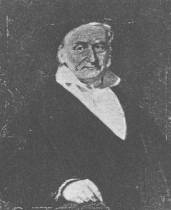
Johann Carl Friedrich Gauss

Johann Carl Friedrich Gauss
Born: 30 April 1777 in Brunswick,
Duchy of Brunswick (modern day Germany)
Died: 23 February 1855 in Göttingen, Hanover (modern day Germany)
Gauss is considered one of the greatest mathematicians (if
not THE greatest mathematician) that have ever lived. His talents were noticed
in elementary school, and he is said to have discovered a problem in his
father's payroll at the age of 3. Quite impressed with Gauss, the Duke of
Brunswick paid for his education at Brunswick Collegium Carolinum, where Gauss
independently discovered Bode's law, the binomial theorem, the
arithmetic-geometric mean, the law of quadratic reciprocity, and the prime
number theorem all before the age of 20. In addition, by this time, he also
made (what he considered to be) his greatest discovery: the construction of a
regular 17-gon by ruler and compass, published in Disquisitiones Arithmeticae
(1801). In 1799, he received his degree from the academy and then began to work
on his doctoral dissertation at the University of Helmstedt on the discussion of
the fundamental theorem of algebra. His interests shifted to applied
mathematics in the later part of his life, and his scientific journal was not
recovered until 1894.
You can find more about Gauss
here.
Page created and maintained by Jorge Cunha